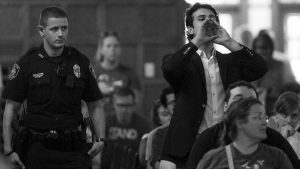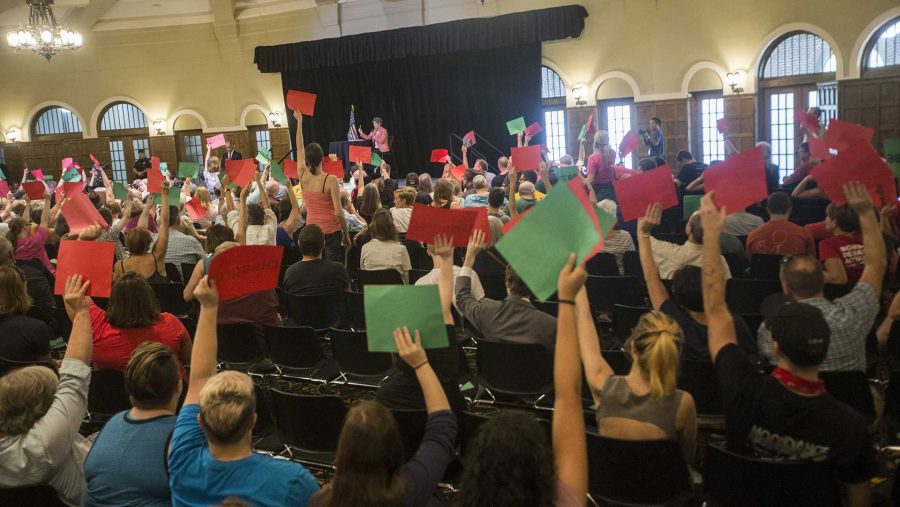Trying to hear the other side in politics can build a community, but it can also leave one living on an isle.
By Molly hunter
molly-hunter@uiowa.edu
At a September town hall at the University of Iowa in which Sen. Joni Ernst, R-Iowa, spoke about health-care reform, she was repeatedly drowned out by audience members’ booing and “fix it” chants.
Enter Cole Kramersmeier, a UI student and a member of the UI College Republicans from Johnston, Iowa. He attends as many free political events on-campus as he can, and once there, he often tries to strike up conversation with people of opposing political views. He was at the Sept. 22 Ernst town hall.
“I tried to talk to someone afterwards — well, they instigated me, because I had a ‘Hawkeyes love Joni’ poster,” Kramersmeier said. “She just yelled at me for being a white man and then I said, ‘Wait — you don’t even know me.’ Then she just turned around, flipped me off, and walked away. Well, that’s not productive.”
Many different public figures, politicians, and government and elected officials have noted that the 2016 presidential election — which happened exactly a year ago today — shed light on a growing political divide in the United States. If you speak to students at the UI, you’ll find most of them agree.
A series of DI interviews revealed there is consensus on a solution to this division: engagement with those of different political persuasions.
But the problem, Kramersmeier said, is people get heated quickly and civil discourse breaks down — as in the case with the woman he spoke to at the Ernst event.
“I know that we probably differ in our political views, and if we would have had a discussion, if we didn’t come to an agreement, we’d have come to a mutual understanding,” Kramersmeier said. “They wouldn’t have just said, ‘He doesn’t like Obamacare because he’s a Nazi and he wants people to die on the street.’ And I wouldn’t say, ‘Well, she just wants Obamacare because she’s a socialist.’ I don’t think she’s an anarcho-communist socialist. … But if you don’t talk to people, nothing happens.”
RELATED: Guest Opinion: American politics is frighteningly polarized
Ruchira Laroia, a UI second-year dental student and self-identified liberal, said she changed her approach to political discourse after the presidential election.
“Prior to the election, I talked to a lot of people who had very similar mindsets, and then post [election], I felt like I needed to change the way I was talking about politics,” she said. “So I started reaching out and honestly just very critically thinking about why maybe some people didn’t vote the way that I did or why people were frustrated with how things were going.”
Laroia said being empathetic and understanding has been hard.
“There was a part of me that was like, ‘You can’t be empathetic towards this, we’ve fought wars against this kind of stuff.’ I just put that to the side,” she said. “Clearly, there is an issue, so I should think about it and think about how I can deal with that in my personal life.”
Laroia said she reached across the aisle by inviting a friend to a lunchtime discussion group.
“He’s a white male, and he’s from a very rural part of Iowa,” Laroia said. “I told him, ‘Hey, there’s this lunch meeting, you should come, there’s free lunch, it’ll be chill.’ And he was like, ‘Oh, that’s not really my scene.’ And I was like, ‘Listen. I know you don’t think that you’re diverse, but you’re from a rural area — that’s diverse — and even though you are part of the majority of voices, we still need to hear your voice, and we still need you to be amplifying other people’s voices.’
“You could see that he was on the fence about it, and I was like, ‘Nobody’s going to yell at you, I promise. Just come, just listen.’ … He was like, ‘I really want to hear your side of the story,’ and that was very affirming.”
Productive political conversations seem to have a few common denominators. For one thing, the people the DI interviewed said they usually don’t take place online.
“The thing about online is, even if it’s on Facebook where people know who you are, it’s still a lot easier to get nasty and not be civil behind a computer screen,” said Josiah Argo, the vice president of Young Americans for Liberty at the UI and a sophomore studying economics and business analytics information systems. “I’ve found that to be true. I’ve never gotten mean or nasty to someone face-to-face. I have done that online.”
Argo, a self-identified moderate libertarian, said face-to-face interactions are important to having a productive political discussion because people are more likely to hear one another out in person than they are online.
“And you’d have to go in knowing that you’re going to hear stuff you’re not going to agree with; you might even be offended,” Argo said. “Listening to the other side does not mean agreeing with them — it just means hearing out what they have to say.”
Argo said it’s also important to be prepared to be wrong.
“If you’re not able to admit that there’s at least a small chance you’re wrong, you’re not going to gain anything,” he said. “It’s also really easy to fall into mud-slinging … if you go into it with an entitlement attitude.”
And as soon as things get angry or personal, Argo said, people stop listening.
But some people don’t even get that far. Some told the DI they aren’t engaging at all.
“I feel like I’m not the most knowledgeable in [politics]. I don’t follow it super-closely, so I don’t know,” said Monica Tipperreiter, a UI student majoring in Spanish and education in English as a second language. “I listen to what other people say, but I usually don’t actively participate.”
Still others told the DI they continue to pursue conversations about politics but only with those who they know share their opinions.
“Usually, we all have the same views, and it’s whatever’s popping online — whatever’s on YouTube — that we are talking about,” said Ahmed Hassan, a bioengineering major at the UI.
Apoorva Raikwar, who studies anthropology at the UI, said she identifies as a liberal. She said the election hasn’t changed the way she moves through the political landscape in her personal life, where she continues to interact with people of similar political persuasions.
“But through a new position in [the UI] student government … I have opportunities to interact with people of different political views. My position is director of diversity and inclusion, so we are passing initiatives that are more contested with individuals in student government who are not as liberal,” Raikwar said. “When I have that hat on, I’m forced to interact with people who might not have the same personal views, but it encourages conversation, and I think it’s been really productive.”

Emiliano Martinez, a Democrat and senior studying history at the UI who serves as the UISG Latinx constituency student senator, said he has political conversations with both his liberal and conservative friends.
“My goal has never been to win politics when I’m talking to people,” Martinez said. “It’s about understanding and being in a place where we’re all having the kind of same conversation.”
Martinez said he doesn’t usually attend when conservative speakers are on campus, but like Kramersmeier, he did go to the Sept. 22 Ernst town hall.
RELATED: Iowa City rallies against Ernst on DACA, health care during town hall
While Ernst was in the middle of answering a question from a constituent at the town hall, Martinez stood up from his seat and began shouting, asking what Ernst planned to do to support Dreamers in the wake of the repeal of Deferred Action for Childhood Arrivals.
“I can speak to my senator how I think is appropriate,” Martinez said.
Martinez said he thinks that’s especially true when he feels an issue is being ignored.
“If the question about DACA students doesn’t get asked, then Joni Ernst came to Iowa City and didn’t hear the full conversation,” Martinez said. “I don’t think I could sit in the rally, not have the question get asked, and walk home.”
Ernst did not answer Martinez’s question at that time, but another town-hall attendee later asked if she would support the Development, Relief, and Education for Alien Minors Act, a bill designed to create a path to citizenship for undocumented immigrants.
While Ernst was giving her answer — she said supports a solution that gives Dreamers a permanent legal status — about a dozen attendees marched out of the room chanting, “We’ve heard enough.”
Martinez said it’s important to be willing to listen to those with whom you disagree.
“Go in not thinking about the next thing you want to tell somebody,” Martinez said. “You’re supposed to listen twice as much as you talk.”



